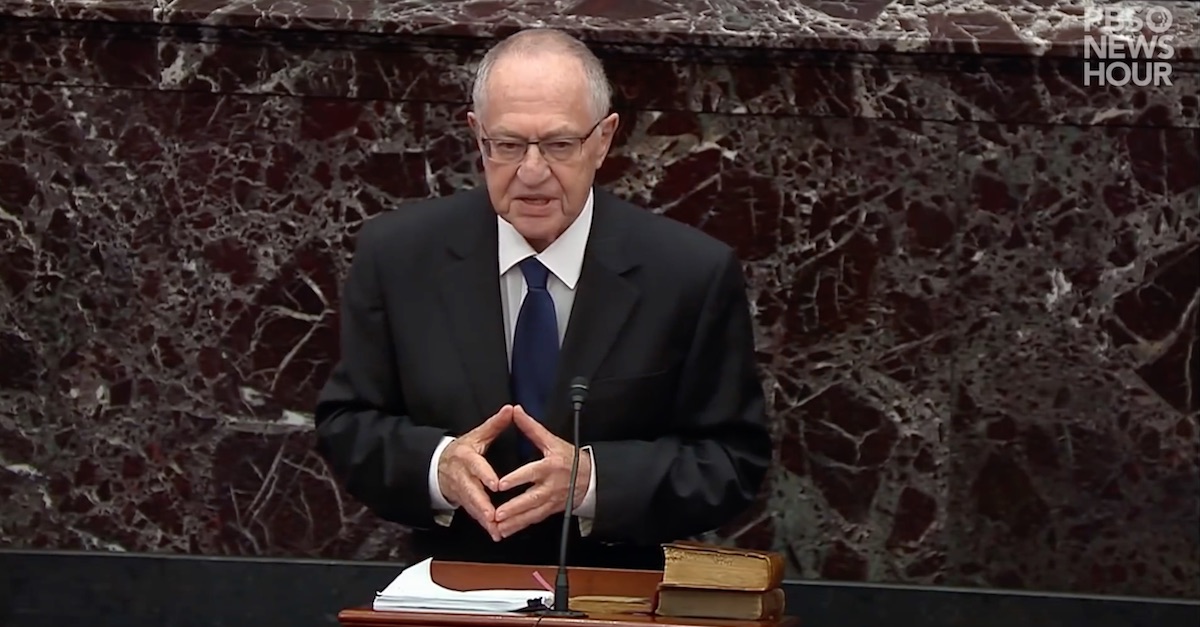
President Donald Trump’s legal team unleashed an audacious defense argument Wednesday, asserting that a sitting president can use the power of his office to do virtually anything, provided its done with the intent of winning re-election in the national interest. The argument, from Harvard Law professor emeritus Alan Dershowitz, is grounded in a fundamentally expansive view of presidential power which–if accepted–would essentially clear Trump of impeachment charges. But legal experts were quick to point out that Dershowitz’s theory was not supported by the text of U.S. Constitution or past precedential decisions on executive authority, eliciting a series of very strong responses and retorts.
“Every public official that I know believes that his election is in the public interest,” Dershowitz said in response to a question about how presidents conduct foreign policy. “And if a president did something that he believes will help him get elected — in the public interest — that cannot be the kind of quid pro quo that results in impeachment.”
In an extreme example, Dershowitz said that a president forcing a foreign leader to build a hotel “with his name on it” and taking a kickback that would be considered “purely corrupt and in the purely private interest,” before concluding with a more muddled hypothetical scenario.
“But a complex middle case is: ‘I want to be elected. I think I’m a great president. I think I’m the greatest president there ever was. And if I’m not elected, the national interest will suffer greatly,’ ” Dershowitz said. “That cannot be an impeachable offense.”
Legal experts derided Dershowitz’s theory as essentially conferring the executive with unlimited power, with many providing examples to highlight the absurdity of the notion.
Supreme Court litigator and former Acting U.S. Solicitor General Neal Katyal called the theory a “joke,” saying that “no responsible constitutional scholar in two centuries agrees with Dershowitz.”
“It’s just a ridiculous argument,” he added.
Constitutional scholar and University of Missouri Law School professor Frank Bowman likened Dershowitz’s proposed executive framework with that of a king “who can do no wrong in the service of his throne.”
Attorney and impeachment expert Ross Garber called Dershowitz’s argument “patently ridiculous,” saying a president “can’t arrest opponents, block polls, break into the DNC, or do lots of other things to get elected.”
Former federal prosecutors Joyce White Vance, Elie Honig, and Barbara McQuade also pushed back on the professor.
An incredulous Vance refuted Dershowitz with a series of rhetorical questions while Honig and McQuade both called the contention “absurd.”
Dershowitz attempted to allay the backlash and refute his detractors Thursday morning, claiming they were distorting his argument.
“I did not say or imply that a candidate could do anything to reassure his reelection, only that seeking help in an election is not necessarily corrupt, citing the Lincoln and Obama examples,” he wrote. “Critics have an obligation to respond to what I said, not to create straw men to attack.”
This led to a series of social media posts that literally compared his rebuttal to his original argument.
Here was Dershowitz’s updated take:
[image via PBS screengrab]